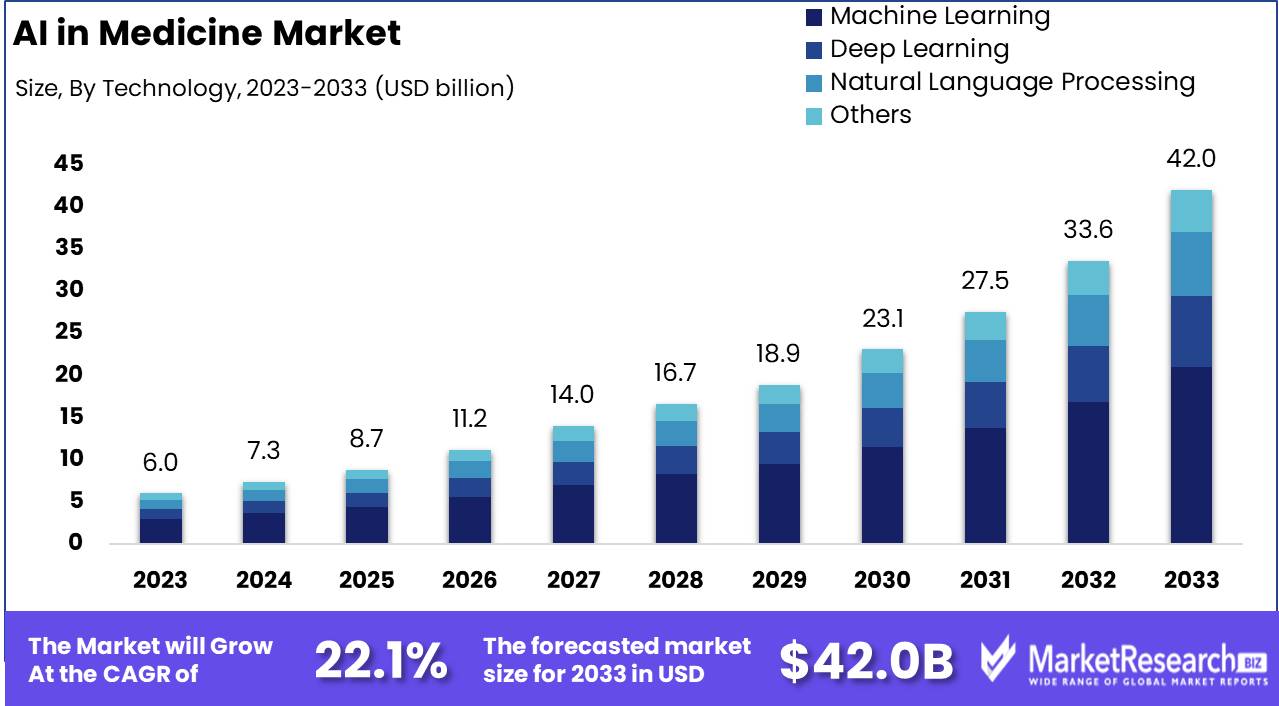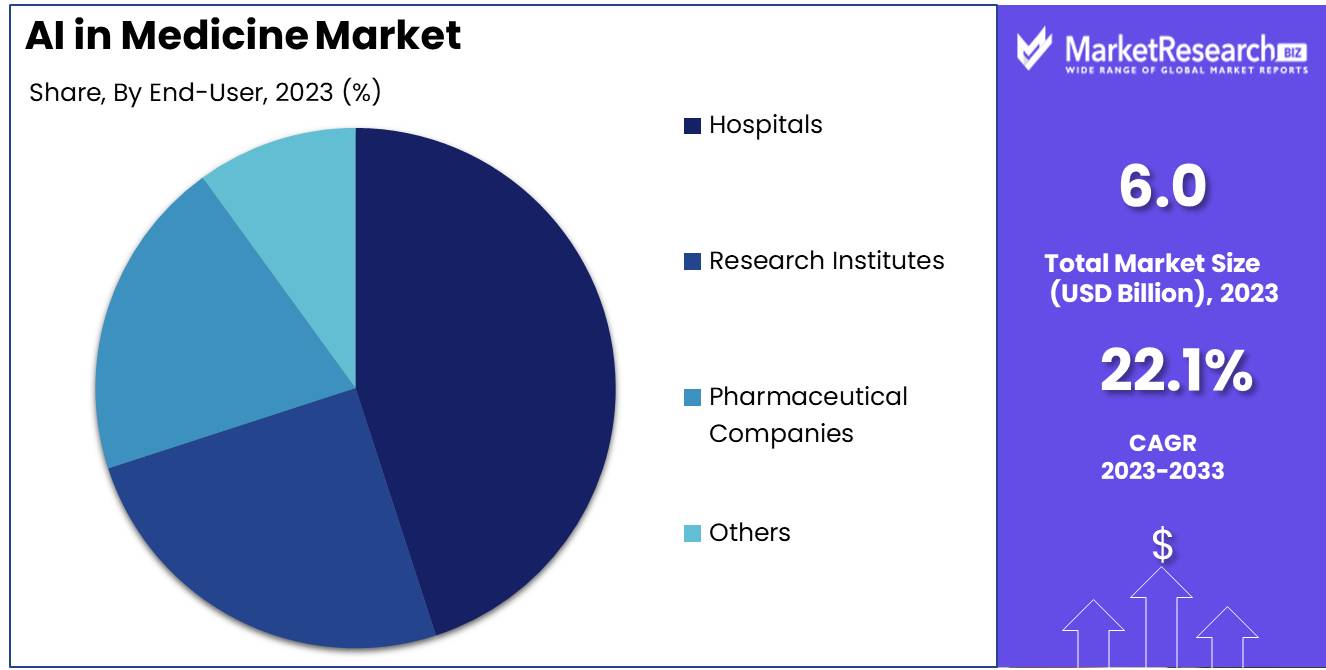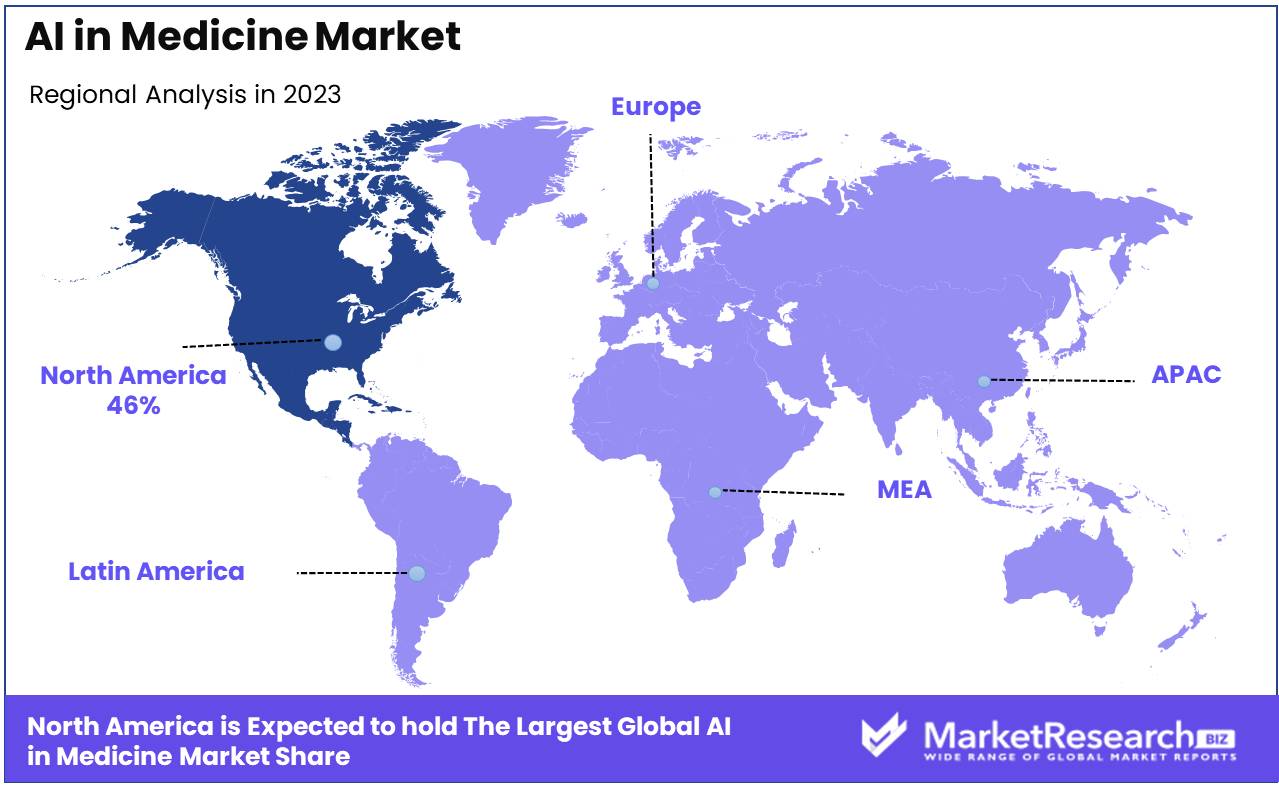
Ai In Medicine Market By Application (Drug Discovery, Medical Imaging & Diagnostics, Personalized Medicine, Virtual Health Assistants, Others), By Technology (Machine Learning, Deep Learning, Natural Language Processing, Others), By End-User (Hospitals, Research Institutes, Pharmaceutical Companies, Others), By Region and Companies - Industry Segment Outlook, Market Assessment, Competition Scenario, Trends and Forecast 2024-2033
-
50481
-
Aug 2024
-
300
-
-
This report was compiled by Vishwa Gaul Vishwa is an experienced market research and consulting professional with over 8 years of expertise in the ICT industry, contributing to over 700 reports across telecommunications, software, hardware, and digital solutions. Correspondence Team Lead- ICT Linkedin | Detailed Market research Methodology Our methodology involves a mix of primary research, including interviews with leading mental health experts, and secondary research from reputable medical journals and databases. View Detailed Methodology Page
-
Quick Navigation
Report Overview
The Global Ai In Medicine Market was valued at USD 6 Bn in 2023. It is expected to reach USD 42.0 Bn by 2033, with a CAGR of 22.1% during the forecast period from 2024 to 2033.
The AI in Medicine Market encompasses the integration of artificial intelligence technologies into medical practices, enhancing diagnostics, treatment planning, and patient care. This market is driven by the increasing adoption of AI-driven applications in clinical settings, aimed at improving efficiency, accuracy, and outcomes in healthcare. Key areas of application include predictive analytics, personalized medicine, and automation of routine tasks, all contributing to more effective and timely medical interventions. The market is characterized by continuous innovation, with advancements in machine learning and data analytics playing a pivotal role in transforming modern healthcare.
 The AI in Medicine Market is rapidly evolving, characterized by its transformative impact on clinical workflows and patient care. As healthcare systems face increasing pressure to enhance efficiency and outcomes, AI-driven solutions are being adopted across various domains, from diagnostics to treatment planning. A prime example is the AI application managing the triage of 1.2 million people in North London, which underscores the potential of AI to streamline decision-making processes and improve patient care. This integration of AI into clinical environments not only enhances operational efficiency but also empowers healthcare professionals with data-driven insights, leading to more accurate and timely interventions.
The AI in Medicine Market is rapidly evolving, characterized by its transformative impact on clinical workflows and patient care. As healthcare systems face increasing pressure to enhance efficiency and outcomes, AI-driven solutions are being adopted across various domains, from diagnostics to treatment planning. A prime example is the AI application managing the triage of 1.2 million people in North London, which underscores the potential of AI to streamline decision-making processes and improve patient care. This integration of AI into clinical environments not only enhances operational efficiency but also empowers healthcare professionals with data-driven insights, leading to more accurate and timely interventions.The market's momentum is further fueled by the upcoming launch of NEJM AI in 2024, a dedicated journal that will explore the latest AI applications in clinical medicine. This reflects the growing recognition of AI's role in advancing medical science and its potential to address complex healthcare challenges. As AI continues to mature, its applications in medicine are expected to expand, driven by advancements in machine learning, natural language processing, and big data analytics.
The AI in Medicine Market is poised for significant growth, with key players likely to focus on developing specialized AI tools that cater to specific medical needs. The ability of AI to enhance precision medicine, automate administrative tasks, and support clinical decision-making will be critical in shaping the future of healthcare. Companies that prioritize innovation, ethical AI use, and collaboration with medical institutions are expected to lead the market, driving its evolution in the coming years.
Key Takeaways
- Market Value: The Global Ai In Medicine Market was valued at USD 6 Bn in 2023. It is expected to reach USD 42.0 Bn by 2033, with a CAGR of 22.1% during the forecast period from 2024 to 2033.
- By Application: Medical Imaging & Diagnostics represents 35% of the market, essential for improving diagnostic accuracy and efficiency.
- By Technology: Machine Learning leads with 50%, crucial for processing vast amounts of medical data.
- By End-User: Hospitals make up 45%, utilizing AI for advanced patient care and operational efficiency.
- Regional Dominance: North America holds a 46% market share, driven by technological innovation and high healthcare expenditure.
- Growth Opportunity: Expanding AI applications in personalized medicine can significantly enhance patient outcomes and drive market growth.
Driving factors
Advancements in AI and Machine Learning Algorithms Propel Market Innovation
The AI in Medicine Market is experiencing rapid growth, primarily driven by advancements in AI and machine learning (ML) algorithms. These technologies have reached a level of sophistication that allows for unprecedented capabilities in analyzing complex medical data, improving diagnostic accuracy, and predicting patient outcomes. AI algorithms are now capable of processing vast amounts of data quickly and accurately, identifying patterns that would be impossible for human clinicians to detect.
Deep learning models have demonstrated remarkable success in image recognition tasks, such as identifying tumors in radiological images, with accuracy rates that often surpass human experts. The continued refinement and application of these algorithms are expected to drive significant innovation in medical diagnostics, treatment planning, patient engagement technology and patient monitoring, fueling market growth.
Increasing Demand for Precision Medicine and Personalized Treatments Drives Adoption
The growing demand for precision medicine and personalized treatments is another critical factor contributing to the expansion of the AI in Medicine Market. Precision fermentation medicine aims to tailor medical treatment to the individual characteristics of each patient, including their genetic makeup, lifestyle, and environment. AI plays a crucial role in this field by enabling the analysis of large datasets, such as genomic information, to identify personalized treatment options.
The global precision medicine market is projected to grow, reflecting the increasing emphasis on individualized care. AI's ability to analyze diverse data sources and provide actionable insights is instrumental in advancing precision medicine, making it an indispensable tool in the push toward more effective and personalized healthcare solutions.
Growth in Healthcare Data Necessitates Efficient Analysis Solutions
The exponential growth in healthcare data is creating a pressing need for efficient analysis tools, which is significantly boosting the AI in Medicine Market. The volume of healthcare data is expected to exceed 2,300 exabytes by 2025, driven by the widespread adoption of electronic health records (EHRs), wearable devices, and other digital health technologies. This data explosion presents both a challenge and an opportunity for the healthcare industry. AI and machine learning offer powerful solutions for managing and extracting meaningful insights from these vast datasets.
By automating data analysis, AI enables healthcare providers to make faster, more informed decisions, leading to improved patient outcomes and operational efficiencies. The increasing reliance on AI for data management and analysis is thus a key driver of market growth, as it addresses the critical need for scalability and accuracy in modern healthcare systems.
Restraining Factors
High Implementation and Integration Costs Limit Market Penetration
One of the primary restraining factors for the AI in Medicine Market is the high cost associated with implementing and integrating AI solutions into existing healthcare systems. The deployment of AI technologies requires significant investment in infrastructure, software, and specialized personnel to ensure seamless integration with current medical practices and technologies. For many healthcare providers, particularly smaller institutions or those in developing regions, these costs can be prohibitive, leading to slower adoption rates.
The complexity of integrating AI with legacy systems can further escalate expenses, creating barriers to widespread implementation. This cost barrier may limit market growth, particularly in regions or organizations with limited financial resources, thereby slowing the overall pace of AI adoption in medicine.
Concerns Over Data Privacy and Ethical Issues Hinder Market Expansion
Another significant challenge facing the AI in Medicine Market is the growing concern over data privacy and ethical issues. The use of AI in healthcare often involves the processing of sensitive patient data, raising questions about data security, patient consent, and the potential for misuse of information. These concerns are exacerbated by regulatory complexities and varying standards across different regions, making it difficult for healthcare providers to navigate the legal landscape.
Ethical issues, such as the potential for AI-driven decisions to perpetuate biases or reduce human oversight in critical medical decisions, further complicate the adoption of AI technologies. These concerns can lead to resistance from both healthcare providers and patients, thereby limiting the market's growth potential. Addressing these challenges requires robust data governance frameworks and clear ethical guidelines to build trust and ensure the responsible use of AI in medicine.
By Application Analysis
Medical imaging and diagnostics comprise 35% of the AI in Medicine Market by application.
In 2023, Medical Imaging & Diagnostics held a dominant market position in the By Application segment of the AI in Medicine Market, capturing more than a 35% share. The integration of AI in medical imaging and diagnostics has revolutionized the healthcare industry, enabling faster, more accurate diagnoses and improving patient outcomes. AI-driven tools have been instrumental in interpreting complex medical images, such as X-rays, MRIs, and CT scans, with greater precision, reducing the margin of human error. This segment's dominance is largely driven by the growing demand for early detection and diagnosis of diseases like cancer, cardiovascular conditions, and neurological disorders. Additionally, the efficiency gains in radiology departments and the increased adoption of AI in imaging centers across North America and Europe have significantly contributed to this trend.Drug discovery, although vital, is still emerging in terms of AI application, focusing on accelerating the development of new drugs through predictive analytics and AI-powered simulations. Personalized medicine and virtual health assistants are also growing areas, leveraging AI to tailor treatments and provide real-time healthcare advice, respectively, but they currently hold smaller shares compared to medical imaging and diagnostics.
By Technology Analysis
Machine learning accounts for 50% of the AI in Medicine Market by technology.
In 2023, Machine Learning held a dominant market position in the By Technology segment of the AI in Medicine Market, capturing more than a 50% share. Machine learning (ML) continues to be the cornerstone of AI applications in medicine, driving innovations across diagnostics, treatment planning, and predictive analytics. The ability of ML algorithms to analyze vast amounts of medical data, identify patterns, and make predictions has been crucial in enhancing clinical decision-making processes. This technology's widespread adoption is evident in its application across various medical fields, from oncology to cardiology, where ML models are used to predict patient outcomes, optimize treatment plans, and streamline drug discovery processes. The dominance of machine learning is particularly pronounced in regions like North America, where healthcare providers and research institutions have heavily invested in AI infrastructure.Deep learning and natural language processing (NLP) are also significant contributors to the AI in medicine market, with deep learning excelling in image and pattern recognition tasks, and NLP enhancing the understanding and processing of unstructured clinical data. However, these technologies, while impactful, have not yet surpassed the broad applicability and adoption of machine learning in the medical field.
By End-User Analysis
Hospitals represent 45% of the AI in Medicine Market by end-user.
In 2023, Hospitals held a dominant market position in the By End-User segment of the AI in Medicine Market, capturing more than a 45% share. Hospitals are at the forefront of AI adoption in medicine, using advanced AI tools to improve patient care, streamline operations, and enhance diagnostic accuracy. The implementation of AI in hospitals is driven by the need to manage large patient volumes efficiently while maintaining high standards of care. AI technologies are being integrated into various hospital functions, from emergency departments to specialized units such as oncology and radiology, where they assist in everything from patient triage to treatment planning. This widespread use of AI in hospitals is particularly significant in developed markets like North America and Europe, where healthcare systems are increasingly relying on AI to address challenges related to aging populations, chronic disease management, and healthcare workforce shortages.Research institutes and pharmaceutical companies also play crucial roles as end-users of AI in medicine, focusing on the development of new drugs, clinical trials, and the exploration of personalized medicine approaches. However, the scale and immediacy of AI's impact in hospital settings have positioned them as the leading segment in this market.

Key Market Segments
By Application
- Drug Discovery
- Medical Imaging & Diagnostics
- Personalized Medicine
- Virtual Health Assistants
- Others
By Technology
- Machine Learning
- Deep Learning
- Natural Language Processing
- Others
By End-User
- Hospitals
- Research Institutes
- Pharmaceutical Companies
- Others
Growth Opportunity
Development of AI-Driven Diagnostic and Treatment Planning Tools
The development of AI-driven diagnostic and treatment planning tools presents a significant growth opportunity for the AI in Medicine Market in 2024. As AI algorithms become more sophisticated, they are increasingly being utilized to enhance diagnostic accuracy and optimize treatment plans. AI-powered tools can analyze complex datasets, including medical images, lab results, and patient histories, to provide precise and personalized treatment recommendations.
This capability is particularly valuable in oncology, cardiology, and other fields where early diagnosis and tailored treatments are critical. The global AI in healthcare diagnostics market is expected to grow, reflecting the growing reliance on AI to support clinical decision-making. Companies that invest in developing these advanced tools are well-positioned to capture a substantial share of the market, driving innovation and improving patient outcomes.
Expansion in Telemedicine and Remote Healthcare Services
The expansion of telemedicine and remote healthcare services offers another promising avenue for growth in the AI in Medicine Market. The COVID-19 pandemic has accelerated the adoption of telemedicine, and AI is playing a crucial role in enhancing the quality and efficiency of remote care. AI-powered platforms can assist in remote patient monitoring, predictive analytics, and virtual consultations, enabling healthcare providers to deliver personalized care at scale.
The global telemedicine market is projected to grow, creating a substantial opportunity for AI-driven solutions to support this growth. By integrating AI into telemedicine platforms, companies can offer more comprehensive and effective remote healthcare services, addressing the increasing demand for accessible and efficient medical care.
Latest Trends
AI-Driven Predictive Analytics Transforming Patient Care
In 2024, the use of AI for predictive analytics in patient care is set to be a defining trend in the AI in Medicine Market. Predictive analytics, powered by AI, allows healthcare providers to foresee potential health issues before they become critical, enabling proactive interventions. AI algorithms can analyze vast amounts of patient data, including genetic information, lifestyle factors, and historical health records, to predict the likelihood of diseases such as diabetes, heart conditions, or cancer.
This capability not only improves patient outcomes by facilitating early diagnosis and treatment but also reduces healthcare costs by preventing costly emergency interventions. The global market for AI in predictive analytics in healthcare is expected to grow significantly, reflecting the increasing adoption of these technologies as a standard part of patient care.
Integration of AI with Electronic Health Records (EHR) Enhances Decision-Making
Another key trend for 2024 is the integration of AI with electronic health records (EHR) to improve clinical decision-making. EHR systems are repositories of vast amounts of patient data, but they are often underutilized due to the sheer volume and complexity of the information they contain. By integrating AI, healthcare providers can extract actionable insights from EHRs, enabling more informed and timely decisions.
AI can help identify patterns, suggest treatment options, and flag potential risks, thereby enhancing the quality of care. This integration is also expected to streamline workflows, reduce administrative burdens, and enhance the overall efficiency of healthcare systems. The trend towards AI-enhanced EHR systems is poised to drive significant advancements in patient care and operational efficiency across the healthcare sector.
Regional Analysis
In 2023, North America led the AI in Medicine Market, commanding a 46% share.
North America's dominance in the AI in Medicine Market is underpinned by significant investments in healthcare innovation, a well-established infrastructure, and a high adoption rate of advanced technologies. The United States, in particular, is at the forefront, driven by its strong biotechnology and pharmaceutical sectors, which are increasingly integrating AI to enhance drug discovery, diagnostics, and patient care. The presence of leading AI companies and top-tier research institutions further accelerates the market's growth in this region.
In Europe, the AI in medicine market is also thriving, supported by robust healthcare systems and favorable government initiatives aimed at promoting AI adoption in medical practices. Countries such as the United Kingdom, Germany, and France are leading contributors, focusing on AI applications in precision medicine and personalized healthcare. The Asia Pacific region is rapidly emerging as a key player, with significant investments in AI-driven healthcare solutions, particularly in China and Japan. The growing aging population and the increasing prevalence of chronic diseases in these countries are key factors driving the adoption of AI in medicine.
Meanwhile, the Middle East & Africa and Latin America are witnessing steady growth as they gradually embrace AI technologies in their healthcare systems. These regions are focusing on improving healthcare access and outcomes through AI, with initiatives supported by both governmental and private sector investments.
North America's leadership in the AI in Medicine Market is reinforced by its advanced healthcare ecosystem and the proactive role of government and private sectors in promoting AI integration across various medical applications, ensuring the region remains at the cutting edge of medical innovation.

Key Regions and Countries
North America
- US
- Canada
- Mexico
Western Europe
- Germany
- France
- The UK
- Spain
- Italy
- Portugal
- Ireland
- Austria
- Switzerland
- Benelux
- Nordic
- Rest of Western Europe
Eastern Europe
- Russia
- Poland
- The Czech Republic
- Greece
- Rest of Eastern Europe
APAC
- China
- Japan
- South Korea
- India
- Australia & New Zealand
- Indonesia
- Malaysia
- Philippines
- Singapore
- Thailand
- Vietnam
- Rest of APAC
Latin America
- Brazil
- Colombia
- Chile
- Argentina
- Costa Rica
- Rest of Latin America
Middle East & Africa
- Algeria
- Egypt
- Israel
- Kuwait
- Nigeria
- Saudi Arabia
- South Africa
- Turkey
- United Arab Emirates
- Rest of MEA
Key Players Analysis
The global AI in Medicine Market is projected to experience robust growth in 2024, driven by the increasing adoption of AI technologies across healthcare systems. IBM Watson Health and Google Health are expected to be at the forefront of this market, leveraging their advanced AI platforms to provide predictive analytics, personalized treatment plans, and improved diagnostic accuracy. Their vast data repositories and cutting-edge machine learning algorithms will continue to set them apart as leaders in the AI-driven transformation of healthcare.
Microsoft Corporation and NVIDIA Corporation are likely to play pivotal roles in enabling AI applications in medicine through their powerful cloud computing and AI hardware solutions. Microsoft’s Azure cloud platform and NVIDIA’s GPUs are anticipated to remain essential tools for healthcare providers and AI developers. These companies are expected to continue forming strategic partnerships with healthcare institutions and AI startups, driving innovation and accelerating the integration of AI into clinical workflows.
GE Healthcare and Siemens Healthineers are positioned to capitalize on the growing demand for AI-enhanced medical imaging and diagnostics. Their extensive portfolios of AI-powered imaging devices and software solutions are expected to see increased adoption as healthcare providers seek to enhance diagnostic accuracy and efficiency. Meanwhile, Tempus Labs, Inc. and Zebra Medical Vision are likely to gain traction in the market through their focus on precision medicine and AI-driven diagnostic tools, which are becoming increasingly critical in oncology and other complex therapeutic areas. As AI continues to reshape the medical landscape, these key players will be instrumental in driving the future of AI in medicine.
Market Key Players
- IBM Watson Health
- Google Health
- Microsoft Corporation
- NVIDIA Corporation
- GE Healthcare
- Siemens Healthineers
- Philips Healthcare
- Cerner Corporation
- Tempus Labs, Inc.
- Zebra Medical Vision
Recent Development
- In May 2024, Siemens Healthineers launched an AI-powered imaging system that enhances the accuracy of radiology interpretations. This system aims to improve diagnostic accuracy by 25%.
- In January 2024, Google Health introduced an AI-driven diagnostic tool that assists doctors in detecting early-stage diseases. This tool is expected to reduce diagnostic times by 30%.
Report Scope
Report Features Description Market Value (2023) USD 6 Bn Forecast Revenue (2033) USD 42.0 Bn CAGR (2024-2033) 22.1% Base Year for Estimation 2023 Historic Period 2018-2023 Forecast Period 2024-2033 Report Coverage Revenue Forecast, Market Dynamics, Competitive Landscape, Recent Developments Segments Covered By Application (Drug Discovery, Medical Imaging & Diagnostics, Personalized Medicine, Virtual Health Assistants, Others), By Technology (Machine Learning, Deep Learning, Natural Language Processing, Others), By End-User (Hospitals, Research Institutes, Pharmaceutical Companies, Others) Regional Analysis North America - The US, Canada, & Mexico; Western Europe - Germany, France, The UK, Spain, Italy, Portugal, Ireland, Austria, Switzerland, Benelux, Nordic, & Rest of Western Europe; Eastern Europe - Russia, Poland, The Czech Republic, Greece, & Rest of Eastern Europe; APAC - China, Japan, South Korea, India, Australia & New Zealand, Indonesia, Malaysia, Philippines, Singapore, Thailand, Vietnam, & Rest of APAC; Latin America - Brazil, Colombia, Chile, Argentina, Costa Rica, & Rest of Latin America; Middle East & Africa - Algeria, Egypt, Israel, Kuwait, Nigeria, Saudi Arabia, South Africa, Turkey, United Arab Emirates, & Rest of MEA Competitive Landscape IBM Watson Health, Google Health, Microsoft Corporation, NVIDIA Corporation, GE Healthcare, Siemens Healthineers, Philips Healthcare, Cerner Corporation, Tempus Labs, Inc., Zebra Medical Vision Customization Scope Customization for segments, region/country-level will be provided. Moreover, additional customization can be done based on the requirements. Purchase Options We have three licenses to opt for: Single User License, Multi-User License (Up to 5 Users), Corporate Use License (Unlimited User and Printable PDF) -
-
- IBM Watson Health
- Google Health
- Microsoft Corporation
- NVIDIA Corporation
- GE Healthcare
- Siemens Healthineers
- Philips Healthcare
- Cerner Corporation
- Tempus Labs, Inc.
- Zebra Medical Vision




